
What books made your favorites list in 2019? In this episode, Cheri and Amy share their list and the top lessons they learned from them. If you’re looking for a great read, listen in for books that will challenge you and shift your ways of thinking and doing.
(This page contains affiliate links. Your clicks and purchases help support Grit 'n' Grace at no extra charge to you.)
 Recommended Resources
Recommended Resources
Downloads
Your Turn
- Which of the books mentioned in this episode appeal to you the most?
- What books made your “Favorite Books of 2019” list?
- How have books changed your way of thinking this year?
Transcript — scroll to read here (or download above)
****
Grit ‘n’ Grace: Good Girls Breaking Bad Rules
Episode #184: How to Find Books that Create a Shift
Amy:
Alright, Cheri! So what did our listeners tell us to talk about this week?
Cheri:
One of them said she would listen to anything about how to live and how to love Jesus. So that’s kind of wide open. Thank you so much for permission.
<Laughter>
Amy:
Somebody wants us to talk about anything about Jesus. We’ll sign up for that!
Cheri:
Well, I thought, we might try the challenge, ‘cause one of the things you and I have wanted to talk about is some of the books we’ve read recently. And these are books just that we’ve read on our own, not because we’ve interviewed people for the podcast.
So the challenge for this episode is can we talk about how to live and love Jesus while also talking about a couple of the books that have influenced us the most recently?
Amy:
I think we can do it.
Cheri:
Think so? Alright, well, I’m going to share, just real briefly, the most recent three books or the most influential three books that I’ve read, but I’m only going to – we’re going to talk about the last one here.
So you recommended Inheritance, which is a memoir, and I’m not gonna – oh my goodness. It was a relatively short read. Beautifully, beautifully written about a woman who basically thinks she has known who she is and what her family history is. And in a very short timeframe discovers a lot of that was not actually true. And it was, it was mesmerizing to listen to her share her journey and ask the hard questions and share the research she’d done. So I really enjoyed that one. What’s one that you’ve read, recently?
Amy:
I’m going to talk about a manuscript I just read that is coming soon. And it’s by an author that you have on your list, too, Jen Bleakley. And her new book that’s coming out, it’s called Pawverbs. And it is a, it’s 100 devotions with pet stories and Proverbs.
Cheri:
I love it!
Amy:
Girl. I wasn’t sure if I was gonna love it, but you know what, I totally, totally did. There were so many of them. I cried through the spiritual application. I loved it. So tell about your book that’s on the list by Jen.
Cheri:
It’s Joey. Joey, the blind horse, at Hope Reins. And, okay, the thing you did not warn me about, ‘cause I listened to that one as I was driving. You did not warn me to have boxes of Kleenex is in the car, and that I would absolutely need to pull over and sob a couple times. But it was beautiful. It was a beautifully written book. So, what’s another book that you’ve read recently that you loved?
Amy:
So, I am on a memoir binge. I just finished Wild, which let me do a little disclaimer, that it has some strong language and also sex in it, so I didn’t read it because of that. I read it because I’m studying memoir. But it is a fascinating story of change out in the wild. So, but, if you’re not up for strong language and some other spicy stuff, don’t read it. But I did think it was a good book.
Cheri:
Well, it was brilliantly written, and, I think she spent 10 years crafting that book. And you can tell. It is, again, it’s a book I listened to, and, yeah, there was so much I loved about it.
Alright. Well, the book that’s had the most impact on me at this point is Atomic Habits. And I didn’t just listen to it. I started listening to it, and I realized, “Oh no, I need the hardback.” And so, I got the hardback, and I literally listened to the entire book while sitting in a chair with my highlighters. I’ve been marking the book up and annotating it while listening to it.
Amy:
Awesome. Well, so I have to get that now, too. But my, again, another memoir, Maybe You Should Talk To Someone is probably my favorite book I’ve read recently. Just so good.
Cheri:
Well, this is Cheri Gregory.
Amy:
And I’m Amy Carroll.
Cheri:
And you’re listening to Grit’n’Grace: Good Girls Breaking Bad Rules. The podcast that equips you to lose who you’re NOT, love who you ARE, and live your one life WELL.
Amy:
Today, we’re talking about two books that have changed our lives.
Cheri:
Okay. So I’m going to go first here.
I’m going to talk about Atomic Habits. Feel free to interrupt me at any point here. And I’m just going to share my top three takeaways ‘cause my hardback book literally glows in the dark it’s got so much highlighting in it.
So, the first thing that I loved is he said don’t focus on what I want to achieve, which I’ve been really stuck on ‘cause I’ve got this manuscript I’ve been trying to work on for almost a year now, and I really want to achieve it. I really want to finish it. But he said focus on who I want to become.
And the question that he suggested asking, in any given situation, I would ask what would a ‘blank’ person do? So if I’m in the kitchen and I’m reaching for sugar, what would a healthy person do? If I’m in a relational situation, and I’m getting myself more and more upset, what would a loving person or what would a compassionate person do? Or maybe what would a boundaried person do?
And so, what this did for me, you know, of course as a Christian, I grew up saying I want to become Christ-like. You know, that’s what Christian means. And here’s the thing, I’ve never taken that WWJD at all seriously. Why would Jesus do? It just seemed like a cliche that we use to sell Jesus junk.
<Laughter>
Like, you see it on bracelets and you see it on all sorts of stuff that’s sold for cheap.
Amy:
T-shirts.
Cheri:
But I realized it’s a very practical question to ask when we’re aiming to live and love the way that Jesus did.
So what would a ‘blank’ person do? Who do I want to become? And, of course, I want to become who God created me to be. And so, to be able to ask in any given situation as I’m pausing to make a decision, is this going to help me move forward in that direction?
The other thing, second thing, and you’re going to love this cause it’s a new vocabulary word. What could be better?
Amy:
Man. We love a glossary, don’t we?
Cheri:
Absolutely. Bad habits are autocatalytic.
Amy:
Whoa. What does that mean?
Cheri:
Isn’t that a great word? Autocatalytic. I know. I have not been able to work it into conversation, which is why I’m so glad we’re talking today.
<Laughter>
Amy:
I love that about you!
Cheri:
It does not fit in casual conversation. I’ve tried, trust me, and I’ve stopped, which is probably really good.
Autocatalytic means the process feeds itself. They foster the feelings they’re trying to numb. You feel bad, so you eat junk food because you eat junk food you feel bad.
Watching TV makes you feel sluggish so you watch more TV, because you don’t have the energy to do anything else.
Or in my case, I don’t write because I don’t feel like I can write because I don’t feel like I’m in the right mood to write, but, because I’m not writing, I’m never in the mood to write and, thus, I continue not writing.
So, yeah! So, that was like, “Oh.” And just, just, I don’t know, is it because I have a new vocabulary word that now I’m excited to look forward in my life. I’m afraid that’s the case. I’m afraid I really am that shallow. I am now going to examine my life more closely because I have a new vocabulary word. Hey!
<Laughter>
Amy:
We have something to slap on that thing! Well, when you were talking about the food and the TV, I was like, Oh, wow! Did we have to go there on the podcast today? Ahh!
Cheri:
I wasn’t going to point out that you became very silent and that you stopped smiling. I was going to cover you for you, Amy, but since you called yourself out on it.
Amy:
Boo!
<Laughter>
Cheri:
Hey! Right now it is the end of January, early part of February. It’s the perfect time to start the year over. We’d given up on whatever New Year’s resolutions we didn’t make.
We now remember, Oh yeah, we’re human. We’re not changing everything all at once. So it’s a great time to use the word autocatalytic.
We’re going to see how many more times I can say that this episode. Just warning you.
Amy:
I just love that.
<Laughter>
Cheri:
Number three is we do more of what is easy. And this one, of course, made me feel tremendous Protestant guilt because I was raised that, basically, if it’s not hard, it must not be godly.
Like, the way you know something is truly Christian, and this is just inside my brain, I’m not saying it’s true or even in the Bible, but the way you know is if it really hurts. Like, it really takes time and effort. That’s how you proved how much you love God. You know, never mind there’s a scripture about His yoke being easy and light. He didn’t really know what He was talking about there.
<Laughter>
So, but according to Atomic Habits we do more of what is easy. And I’ve been trying to fight against my tendencies. I’ve been trying to fight really hard. And I was like, what would it be like if I actually went along with this idea that I do more of what’s easy?
And so, one of the ways that this actually came to fruition is he talks about environment design, and he says we need to prime the environment for future use. He says you can optimize your environment to make actions easier. Too often we try to start habits in high friction environments. We try to follow a strict diet while we’re out to dinner with friends. We try to write a book in a chaotic household. I didn’t really appreciate him being quite that personal.
We try to concentrate while using a smartphone filled with distractions. It doesn’t have to be this way. We can remove the points of friction that hold us back.
So I had been avoiding cleaning up my office because I thought, no, no, that’s playing office. That’s procrastination. I know that anytime I have the urge to clean, I mean, we know this is writers, right? Anytime we have the urge to clean, we’re avoiding writing our book.
<Laughter>
But when he talked about priming the environment for future use, and here’s what he said, “Whenever you organize a space for its intended purpose, you are priming it to make the next action easy.”
And what I wrote in my margin was do this in my office. And I did.
Not because I was trying to avoid writing my book, but because my office had gotten so crammed, it was so full, I could hardly walk into it. Every surface was filled. I had so many old projects that hadn’t been dismantled. And I even sent you a picture of me finally going through the old drafts of this manuscript called Exhale. And that book released last year.
And so, I don’t need all of those things anymore. So I put a ton of stuff in the recycling and some other episode we can talk about what I did, if anybody wants to hear about it. But I now have an office that is completely functional and it is easy for me to sit down and write.
Amy:
That’s so good.
Cheri:
And I’m proving that by moving forward. So there’s the three points that I picked up from Atomic Habits.
Amy:
Well, and that makes me think. We did we did Whole 30 last year. The first thing we did before we even started Whole 30 is we took everything out of our house and donated it if it hadn’t been opened yet that we couldn’t eat on Whole 30. And we filled our house with food that we could eat on Whole 30, ‘cause you don’t have to starve on Whole 30.
So, you’re exactly right. It made it easy. I didn’t have pasta staring me in the face every time I opened my pantry. So that’s great. I need to do it again. Oh, yeah, ice cream in my freezer.
<Laughter>
Cheri:
One of the practical things that is an outcome of this is, in the evening when I set my environment, when I redesign my environment for what I’m going to do the next day is, and you know, this may be a no duh for most of our listeners but for maybe the one listener who’s like me and needs to be reminded.
It means having my Bible laying out. My Bible markers laying out. It means having my journal right there. I was keeping my Bible stored in my little carrying case. This may sound really pathetic, but the fact that it was in the carrying case made it harder to get to.
I don’t sound very spiritual right now, but, having it sitting there, sometimes I’ll leave it open to the passage I know I’m going to be reading next with those markers even taken out of their package. It’s like I’m already in the action of immersing in God’s word.
Amy:
I love it.
Cheri:
It’s making it happen. It’s making it happen on a daily basis instead of, you know, and the part of my brain that says if you were more spiritual, you would study God’s words no matter what. I’m just not listening.
And I’m saying, “I’m going to set it up the night before as a joyful expectation, reduce the friction, make it easy to sit down, pick up my Bible and go.”
Amy:
I really just love that. And it really goes back to what you were talking about, what would Jesus do? I wanted to insert this there, but I’ll say it here, ‘cause I think it ties into what you just said. The only way we would know what Jesus would do is if we read Matthew, Mark, Luke, and John, right? I mean we cannot know what Jesus would do any other way. So, the word, the word girls have to insert that here.
So I love that you’re, you’re circling it back around to how do we love Jesus? Well, in all of these things we’re talking about in these books is that we set ourselves up for success in studying the word. Love it. Love it. Love it.
Cheri:
Alright. So I cannot wait to hear what you thought because this is one of my favorite books of 2019, Maybe You Should Talk to Someone. Talk to us.
Amy:
Well, again, this is a secular book. But I think there are so many spiritual applications we Jesus girls can pull out of it. The structure of the book is so fascinating, because, so my first takeaway was that everyone needs help. Nobody has all the answers.
And I lead with that because I wanted to talk about her subtitle, which I loved. The subtitle to Maybe You Should Talk to Someone is A Therapist, HER Therapist, and Our Lives Revealed. And I love that because, so, here’s the therapist getting therapy.
And I don’t know, I just found great solace in that, that someone who we would turn to thinking that they had answers for us needed answers and help for herself. And that, I found solace in that. And that was a big takeaway. Nobody has all the answers. And so –
Cheri:
Did you find yourself, as she was describing her problem before she would go to therapy, did you find yourself going, I know what your problem is?
And then her therapist would start to say things and you’re like, yes, that’s what I would have told her. I think the way she wrote the book kind of invited us to come in and see things that she couldn’t see for herself. And for me, recognizing that process that even a therapist cannot see without help was so valuable.
Amy:
Yes. And that really leads to my second takeaway, which is, taps into one of our recent episodes, which is our blind spots require someone else to help us see them.
So, I mean, here’s this therapist, she has a breakup. So the structure of the book is three strands woven together. She has a personal crisis for which she needs a therapist.
She describes three or four of her own clients and how she is giving them therapy. And she just gives us information about therapy and psychology and how it all works.
And so, those are kind of the three strands that are woven together. But it’s fascinating that she is helping others see what they need to see about their blind spots. She cannot see her own.
<Laughter>
And I was like, that’s why they’re called blind spots. And so, I thought I want to circle back around to that blind spot thing, because it’s just so important to have a therapist or a truth-telling friend or a spiritual mentor. Someone in your life that is telling you the truth about yourself.
And it’s funny, because it’s happening in my marriage more. Like, for a long, long time, and I think it was because of me that I was resistant to hearing truth about myself. But as I’ve become more open to hear truth about myself Barry told me things that are sometimes so ouchy. Oh my gosh! Nobody likes to hear the hard things, but he says it in a kind way, for which I’m thankful, but we have to have someone in our lives that will help us see into our blind spots.
And certainly God can do that. There’s so much in scripture about God shining a light basically on those places in our life. And scripture itself acts as a mirror to us. So sometimes, I think scripture, God uses scripture and the work of His Holy Spirit to show us blind spot about ourselves.
And then this last one, I have to read a quote, and I read this, and I started crying reading it and I thought, wow, that was, I wasn’t expecting to start crying. So I thought there’s something really there.
And the quote is this, “In therapy we aim for self compassion.” And in parenthesis there’s a question, “Am I human? Versus self-esteem, which is a judgment. The question is, am I good or bad?”
That just flattened me. So the two questions, in therapy, we want to ask ourselves the question Am I human? And give ourselves self-compassion. And I think that’s not just in therapy. We can start to adopt that in life, too, versus this am I good or bad?
And for an Enneagram one, reflecting back on our last episode, this is huge because our main thing we want to know is am I good? And so, we access everything.
And I see this so much in myself. Was that good? Was that bad? And if it’s bad, man, I just have attacks of shame. I mean, and sometimes, it’s less than it used to be, but there are times that it’s still very acute. And if I could ask myself the question instead, was that human? And then the followup question for Jesus loving girls is, can my Savior help me with that?
Cheri:
Mmm Hmm.
Amy:
To which the answer is always yes. So I just sat there and read that sentence about three or four times and just bawled and thought I am human, and I don’t need to have the question am I good or bad every time.
I just need to say, “Am I human?” And if it’s something that needs a Savior’s help, then we just go to Him with that.
Cheri:
Mmm Hmm. You know, I think, because when you ask the question, am I human? My first, you know, I just feel my gut resist it. I’m like, well, you know, I suppose if you took my DNA but I really, you know, if I try hard enough.
But you know the truth is if we can answer that question yes, then, the only natural conclusion is then I need God.
If I’m human, I need God.
Amy:
Yes.
Cheri:
And then everything becomes so much simpler. Not easy, but so much simpler.
That was human. I need God. Go to Jesus with it.
Amy:
Yeah.
Cheri:
As opposed to all the craziness we do trying to prove we aren’t human or we’re super human or we’re a better human. You know, even if I’m not as good as I wish I was, at least I’m a better human than most of the humans in my life.
<Laughter>
Amy:
Whew! You said that out loud.
<Laughter>
Cheri:
Maybe nobody else does that, and I shouldn’t have said it.
But I read in, I think it was the book, Barking Up the Wrong Tree. They talked about the difference between self compassion and self esteem. And they said self esteem, the self esteem movement, has made people basically proud of themselves for no good reason. And it makes them very judgmental. Whereas, self-compassion is the root, is the foundation, of having compassion for others.
And I thought she did such a beautiful job with one of the characters in the book. I could not stand this character. Like, I was so offended. I was so revolted. I was, oh, I wanted to find him and take him down.
And then, as she shared the reasons behind why he was so very human and in need of a Savior. This is our words not hers. I bawled because, oh my goodness, it all made sense. And I was like, he was still just as awful and his behaviors were still as bad, but understanding more about his entire story, I had so much more compassion for him.
Amy:
Yeah. Yeah. I’m glad you said that because that was, that would’ve been my fourth takeaway is that nobody’s as bad as we think they are.
Cheri:
Hmm.
Amy:
Yep, yep. And there’s grace all over that.
Cheri:
So this episode doesn’t have a scripture. It doesn’t have a bad rule that we’re breaking, but we hope that in discussing these couple of books that we really enjoyed that you found some practical ideas for how to live and love Jesus and how to live and love like Jesus.
We hope you’ve enjoyed episode 184 of Grit’n’Grace: Good Girls Breaking Bad Rules.
Amy:
Hop on over to our website, gritngracegirls.com/epiosde184.
There you’ll find our transcript and our digging deeper devotional.
Cheri:
Alright, Amy. We’ve been slowly revealing a little bit of information about what’s happening in March and last week you said that it was going to have something to do with community and a bunch of us getting together and you and me.
What else can you tell our listeners?
Amy:
Well, let’s just unveil the whole thing ‘cause they got to get their stuff to be ready for it.
So, starting Monday, March 2nd, we, Cheri and I, are leading an Exhale online book study.
We cannot wait!
Cheri:
Woo woo! This has been on our list ever since we even thought of the idea of the book. We were like we are going to do an online book study. And we cannot wait. So what do they need to do?
Amy:
Go to Facebook and join our community there.
You can find it by searching Exhale online book study and just ask to join, and we’ll let you right in.
Then you’ll also need to get a copy of Exhale.
You can get the audio book, you can get a hard copy, or you can get a Kindle version.
And so, find a copy of Exhale, and optionally, you can get a copy of the group study on Amazon.
Cheri:
Wonderful. Cannot wait!
Amy:
All the information will be within the Facebook group, though, so if you forget all the rest of it, just go there and join.
Cheri:
Sounds like a plan.
Amy:
Next week, join us when we’ll be talking again about the things that you want to hear.
Cheri:
For today, grow your grit. Embrace God’s grace. And when you run across a bad rule, you know what to do. Go right on ahead and…
Amy ‘n’ Cheri:
Break it!
Outtakes
Cheri:
Alright. Well, you know, we could try to come up with a bad rule and a good rule and a scripture for all of this. Or we could just say, hey, we’ve had a really good time talking about a couple of books that changed our lives.
Do you see? Do you see you’re so good at this. Do you see a thread that we’ve woven here?
<Laughter>
Amy:
I got nothing. Yeah, I think we could just…
Cheri:
Yeah. I think this’ll be an episode without a bad rule or a fact to focus on or anything like that. So. Okay. We’ll just wrap it up.
We’ll take it back to the – So, hang on.
So this episode doesn’t have a scripture, it doesn’t have a bad rule that we’re breaking…
You’ll never miss an episode when you sign up for weekly updates!

 Recommended Resources
Recommended Resources


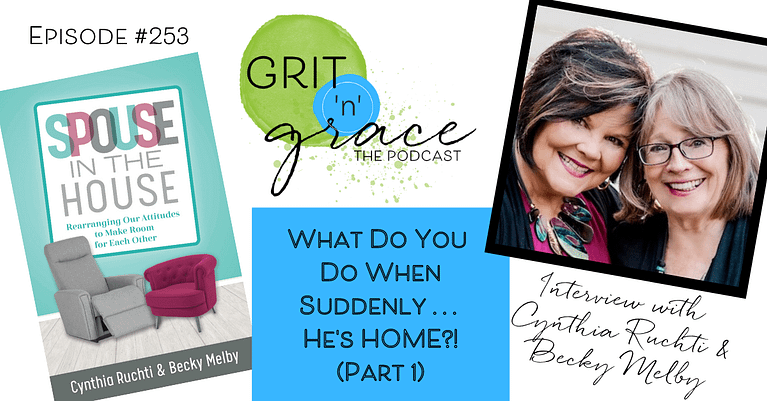
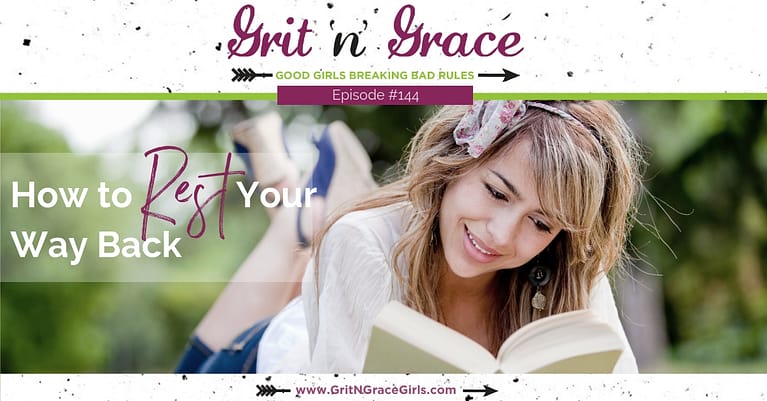
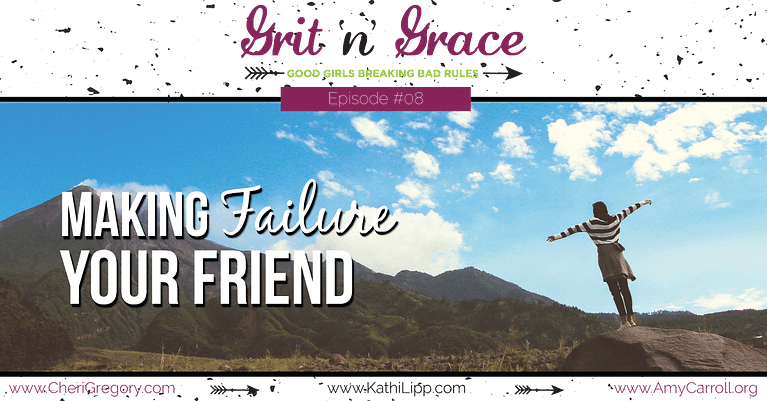
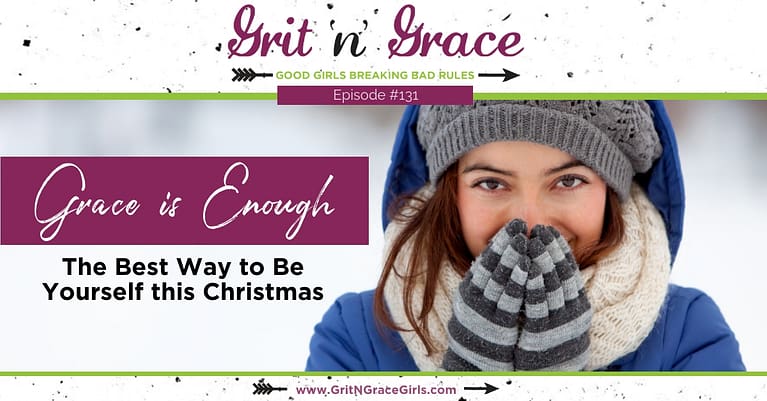
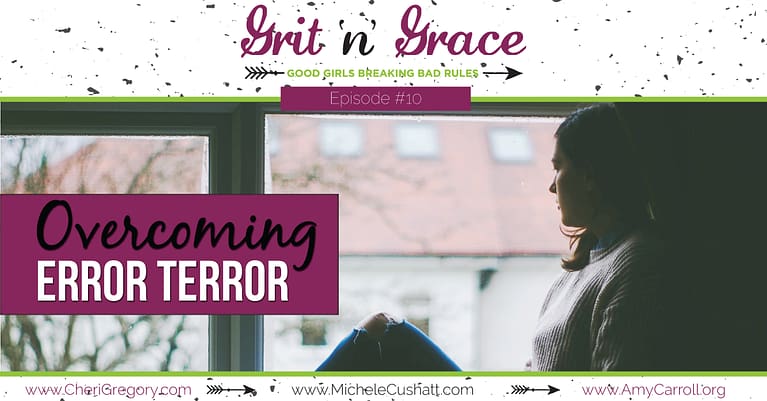
“Atomic Habits” sounds like something I’d like to read; yours is the second podcast that’s raved about it. And yes, I have encountered the word “autocatalytic” while proofreading for scientists and I relate to the excitement about discovering a new word!